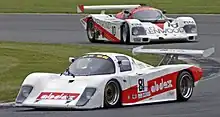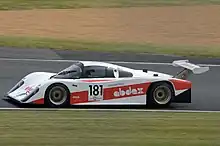 | |||
| Category | Group C2 | ||
|---|---|---|---|
| Technical specifications | |||
| Chassis | Aluminum honeycomb monocoque, carbon-fiber composite/kevlar body | ||
| Suspension | Double wishbones, pull-rod actuated coil springs and shock absorbers, anti-roll bar (front) Lower wishbones, top rockers actuating in-board mounted coil springs over shock absorbers, anti-roll bar (rear) | ||
| Length | 4,410 mm (174 in) | ||
| Width | 1,790 mm (70 in) | ||
| Height | 1,000 mm (39 in) | ||
| Axle track | 1,480 mm (58 in) (front) 1,626 mm (64.0 in) (rear) | ||
| Wheelbase | 2,550 mm (100 in) | ||
| Engine | Ford-Cosworth DFL 3.3 L (201.4 cu in) 90° DOHC V8 naturally-aspirated mid-engined Ford Cosworth BDT 2.1 L (128.1 cu in) DOHC I4 turbocharged mid-engined Porsche 935/76 2.65 L (161.7 cu in) SOHC F6 turbocharged Rover V64V 3.0 L (183.1 cu in) 90° DOHC V6 naturally-aspirated mid-engined Chevrolet 3.0 L (183.1 cu in) 60° DOHC V6 naturally-aspirated mid-engined[2] | ||
| Transmission | Hewland 5-speed manual | ||
| Power | ~ 380 hp (280 kW) | ||
| Weight | 800 kg (1,800 lb) | ||
| Tires | Avon Goodyear | ||
| Competition history | |||
| Debut | 1987 360 km of Jarama[3] | ||
| |||

Tiga GC287 at the 2014 Le Mans Classic
The Tiga GC287 is a sports prototype race car, designed, developed, and built by British manufacturer Tiga Race Cars, for sports car racing, conforming to the Group C2 rules and regulations, in 1987.[4]
References
- ↑ "1987 Tiga GC287 Rover Specifications". Ultimatecarpage.com.
- ↑ "Tiga GT287". Retrieved 24 November 2022.
- ↑ "Tiga GC287 - Photo Gallery - Racing Sports Cars".
- ↑ "World Sports Racing Prototypes - Tiga chassis numbers". www.wsrp.cz.
This article is issued from Wikipedia. The text is licensed under Creative Commons - Attribution - Sharealike. Additional terms may apply for the media files.